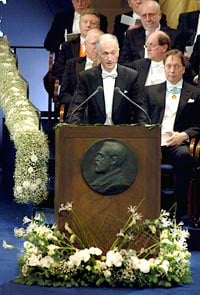Award ceremony speech

Professor Jörgen Weibull delivering the Presentation Speech for the 2005 Bank of Sweden Prize in Economic Sciences in Memory of Alfred Nobel at the Stockholm Concert Hall.
Copyright © Nobel Media AB 2005
Photo: Hans Mehlin
English
Swedish
Presentation Speech by Professor Jörgen Weibull, Member, the Royal Swedish Academy of Sciences, Chairman of the Economics Prize Committee, December 10, 2005.
Your Majesties, Your Royal Highnesses, Honoured Laureates, Ladies and Gentlemen,
War and other conflicts have tormented mankind since time immemorial, more often than not with great suffering and extensive material losses. Yet many societies live in prosperity founded on cooperation and peaceful competition. Why do some groups, organizations and countries succeed in promoting cooperation while others suffer from conflict? Robert Aumann and Thomas Schelling approached this age-old question against the backdrop of the cold war, when an understanding of cooperation and conflict was imperative under the threat of nuclear war. Although they approached the topic from different angles – Aumann from mathematics and Schelling from economics – they shared a vision: that game theory had the potential to reshape the analysis of human interaction.
What, then, is game theory? It is all about strategic interaction. Such interaction may occur within or between families, local communities, firms, organizations or whole countries. In most instances, no single party, or “player”, can determine the outcome single-handedly; the result of interaction depends on everyone’s behavior. Just as in chess or bridge, a player’s best move thus depends on the moves that have been and will be made by other players. Consequently, in strategic interactions each player acts on the information at his or her disposal, as well as on expectations of others’ future actions. However, others’ actions depend, in turn, on their information and expectations about your actions, so all players’ actions, information and expectations are intertwined in a complex and fascinating pattern. The analysis of strategic interaction, with due regard to these complexities, is precisely what game theory is all about.
This year’s Laureates have offered us new insights into the dynamic aspects of conflict and cooperation. Thomas Schelling showed how one party in a conflict can often strengthen its position by overtly worsening or limiting its own options – by “burning its ships”. He also demonstrated that the capability to retaliate can be more useful than the capability to resist an attack, and that uncertain and gradual retaliation can be more credible and less costly than immediate and certain retaliation. These insights have proven to be of great relevance for conflict resolution and the avoidance of war. They have also prompted new developments in economics, in particular concerning our understanding of market competition. For example, a firm can sometimes increase its profit through strategic investment in a large and expensive plant. Even if its average production costs would rise, losses due to inefficient production may be outweighed by the gains generated by competitors’ less aggressive behavior.
Robert Aumann laid the foundation for game-theory analysis of long-run relationships. In many real-world situations, interaction takes place not only once, but repeatedly, over an indefinite time horizon. An example is when competing firms make production decisions or set prices on a daily basis. Aumann’s analysis of repeated games showed how repetition can enable cooperation, even among parties with strong conflicts of interest. The theory of repeated games – which continues to grow and flourish – has given us a more precise understanding of the conditions that facilitate cooperation and prevent conflict. For example, how does the level of cooperation in maintaining common-pool resources in local communities depend on their size and the frequency of interaction? Here, cooperation has positive effects. But this is not always the case. Firms in a market can more easily sustain a high collusive price level if they are few, interact frequently and are not short-sighted regarding their profit. Although such cooperation may be advantageous for the firms in question, it usually harms a third party, the consumers, for whom conflict – in the form of price competition – is more favorable.
Robert Aumann and Thomas Schelling have been instrumental in the development of game theory and in its application to the social sciences. When today’s economists, political scientists and sociologists analyze issues concerning conflict and cooperation, they almost without exception rely on their contributions.
Dear Dr Aumann, Dear Dr Schelling: Thanks to your work, game theory has become the dominant tool for analyzing the age-old question why some groups, organizations and countries succeed in fostering cooperation while others suffer from conflict.
Dr Aumann, you were the first to conduct a full-fledged and formal analysis of long-run relationships, so-called repeated games. The theory of repeated games has enhanced our understanding of cooperation among parties with conflicting interests. It has helped explain economic conflicts such as price wars and trade wars – as well as why some communities are more successful than others in managing common-pool resources, such as grasslands or irrigation systems.
Dr Schelling, you were the first to demonstrate the strategic importance of commitment and the difficulties associated with strategic coordination. These insights have proven to be of great relevance for conflict resolution and the avoidance of war. Your work has also prompted new developments in formal game theory and accelerated the use of game theory throughout the social sciences.
It is an honor and a privilege to convey to you, on behalf of the Royal Swedish Academy of Sciences, our warmest congratulations. I now ask you to receive your Prize from His Majesty the King.
Nobel Prizes and laureates
Six prizes were awarded for achievements that have conferred the greatest benefit to humankind. The 12 laureates' work and discoveries range from proteins' structures and machine learning to fighting for a world free of nuclear weapons.
See them all presented here.
